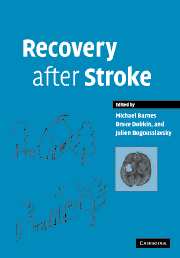Book contents
- Frontmatter
- Contents
- List of authors
- Preface
- 1 Stroke: background, epidemiology, etiology and avoiding recurrence
- 2 Principles of recovery after stroke
- 3 Regenerative ability in the central nervous system
- 4 Cerebral reorganization after sensorimotor stroke
- 5 Some personal lessons from imaging brain in recovery from stroke
- 6 Measurement in stroke: activity and quality of life
- 7 The impact of rehabilitation on stroke outcomes: what is the evidence?
- 8 Is early neurorehabilitation useful?
- 9 Community rehabilitation after stroke: is there no place like home?
- 10 Physical therapy
- 11 Abnormal movements after stroke
- 12 Spasticity and pain after stroke
- 13 Balance disorders and vertigo after stroke: assessment and rehabilitation
- 14 Management of dysphagia after stroke
- 15 Continence and stroke
- 16 Sex and relationships following stroke
- 17 Rehabilitation of visual disorders after stroke
- 18 Aphasia and dysarthria after stroke
- 19 Cognitive recovery after stroke
- 20 Stroke-related dementia
- 21 Depression and fatigue after stroke
- 22 Sleep disorders after stroke
- 23 Technology for recovery after stroke
- 24 Vocational rehabilitation
- 25 A patient's perspective
- Index
20 - Stroke-related dementia
Published online by Cambridge University Press: 05 August 2016
- Frontmatter
- Contents
- List of authors
- Preface
- 1 Stroke: background, epidemiology, etiology and avoiding recurrence
- 2 Principles of recovery after stroke
- 3 Regenerative ability in the central nervous system
- 4 Cerebral reorganization after sensorimotor stroke
- 5 Some personal lessons from imaging brain in recovery from stroke
- 6 Measurement in stroke: activity and quality of life
- 7 The impact of rehabilitation on stroke outcomes: what is the evidence?
- 8 Is early neurorehabilitation useful?
- 9 Community rehabilitation after stroke: is there no place like home?
- 10 Physical therapy
- 11 Abnormal movements after stroke
- 12 Spasticity and pain after stroke
- 13 Balance disorders and vertigo after stroke: assessment and rehabilitation
- 14 Management of dysphagia after stroke
- 15 Continence and stroke
- 16 Sex and relationships following stroke
- 17 Rehabilitation of visual disorders after stroke
- 18 Aphasia and dysarthria after stroke
- 19 Cognitive recovery after stroke
- 20 Stroke-related dementia
- 21 Depression and fatigue after stroke
- 22 Sleep disorders after stroke
- 23 Technology for recovery after stroke
- 24 Vocational rehabilitation
- 25 A patient's perspective
- Index
Summary
Introduction
Stroke can lead to significant cognitive decline (Kase et al., 1998). Populationbased epidemiological studies in Italy (Prencipe et al., 1997), Rotterdam (van Kooten et al., 1998), and Stockholm (Zhu et al., 1998) have shown that the prevalence of dementia is higher in individuals with a history of stroke than in stroke-free individuals (Table 20.1). While population studies show that a history of cerebrovascular disease increases the risk of dementia, they do not prove causality, since a temporal association between stroke and the development of dementia cannot be established with certainty. In order to test hypotheses regarding the etiology of dementia after stroke, the characteristics of the subjects and the stroke need to be studied carefully, and the patients must be assessed serially with detailed neuropsychological evaluations. In 1990, Tatemichi proposed that the prospective study of stroke cohorts could lead to the verification of testable hypotheses regarding the risk factors for, and the etiology and course of, poststroke dementia. Multiple groups have taken up the challenge, and, despite the use of different diagnostic criteria and methods for evaluating cognitive impairment, have found that one-quarter to one-third of patients have dementia after stroke (Table 20.2).
Incidence and prevalence of dementia after stroke
In a pooled analysis of two cohorts totaling 453 patients, researchers at Columbia University (Tatemichi et al., 1992a; Desmond et al., 2000) found that 26.3% (95% confidence interval [CI], 22.2–30.3) had dementia as defined in the Diagnostic and Statistical Manual (DSM)-III-R (American Psychiatric Association, 1987) three months after the stroke. After adjusting for age, education, and race, the odds ratio for dementia was 9.4 (95% CI, 4.2–21.2). The risk increased with age, doubling every 10 years. Groups from Milan (Censori et al., 1996), Helsinki (Pohjasvaara et al., 1997) Florence (Inzitari et al., 1998), Rotterdam (van Kooten et al., 1998), Madrid (Barba et al., 2000), and Lisbon (Madureira et al., 2000) have published similar results (see Table 20.2). Since dementia is differentially associated with early patient attrition, the frequency of dementia may be even higher when allowance is made for patients with stroke whose death or severity of neurological impairment precludes neuropsychological testing (Desmond et al., 1998a). The prevalence of dementia depends on the cognitive domains that are tested and the diagnostic criteria that are used.
- Type
- Chapter
- Information
- Recovery after Stroke , pp. 538 - 555Publisher: Cambridge University PressPrint publication year: 2005



